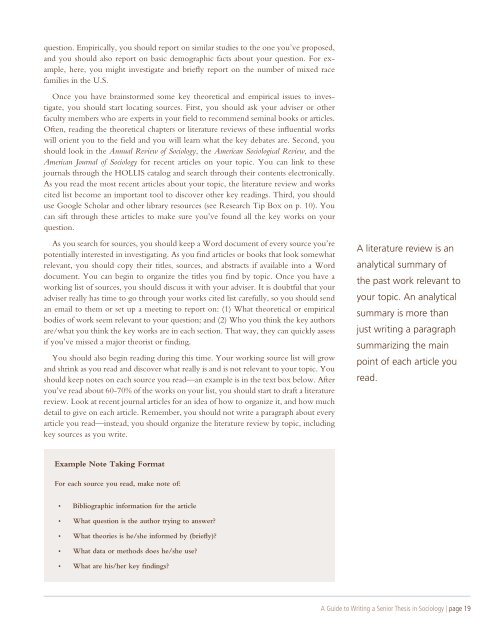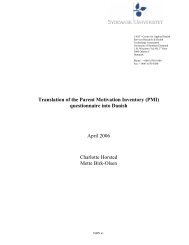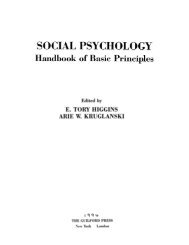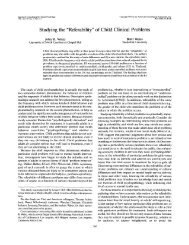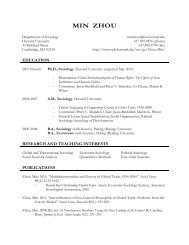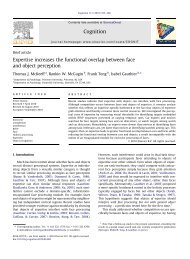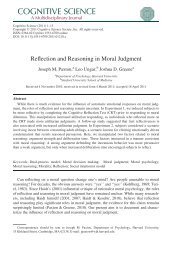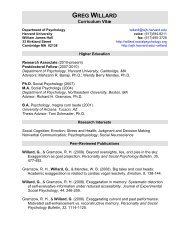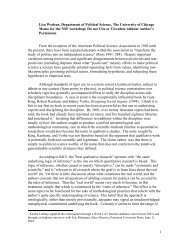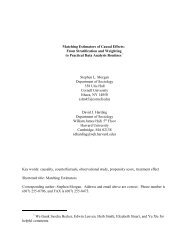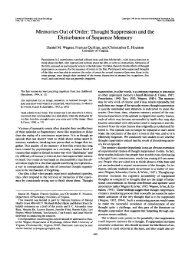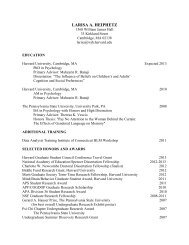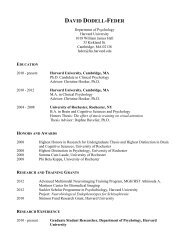A Guide to Writing a Senior Thesis in Sociology - WJH Home Page ...
A Guide to Writing a Senior Thesis in Sociology - WJH Home Page ...
A Guide to Writing a Senior Thesis in Sociology - WJH Home Page ...
Create successful ePaper yourself
Turn your PDF publications into a flip-book with our unique Google optimized e-Paper software.
question. Empirically, you should report on similar studies <strong>to</strong> the one you’ve proposed,<br />
and you should also report on basic demographic facts about your question. For example,<br />
here, you might <strong>in</strong>vestigate and briefly report on the number of mixed race<br />
families <strong>in</strong> the U.S.<br />
Once you have bra<strong>in</strong>s<strong>to</strong>rmed some key theoretical and empirical issues <strong>to</strong> <strong>in</strong>vestigate,<br />
you should start locat<strong>in</strong>g sources. First, you should ask your adviser or other<br />
faculty members who are experts <strong>in</strong> your field <strong>to</strong> recommend sem<strong>in</strong>al books or articles.<br />
Often, read<strong>in</strong>g the theoretical chapters or literature reviews of these <strong>in</strong>fluential works<br />
will orient you <strong>to</strong> the field and you will learn what the key debates are. Second, you<br />
should look <strong>in</strong> the Annual Review of <strong>Sociology</strong>, the American Sociological Review, and the<br />
American Journal of <strong>Sociology</strong> for recent articles on your <strong>to</strong>pic. You can l<strong>in</strong>k <strong>to</strong> these<br />
journals through the HOLLIS catalog and search through their contents electronically.<br />
As you read the most recent articles about your <strong>to</strong>pic, the literature review and works<br />
cited list become an important <strong>to</strong>ol <strong>to</strong> discover other key read<strong>in</strong>gs. Third, you should<br />
use Google Scholar and other library resources (see Research Tip Box on p. 10). You<br />
can sift through these articles <strong>to</strong> make sure you’ve found all the key works on your<br />
question.<br />
As you search for sources, you should keep a Word document of every source you’re<br />
potentially <strong>in</strong>terested <strong>in</strong> <strong>in</strong>vestigat<strong>in</strong>g. As you f<strong>in</strong>d articles or books that look somewhat<br />
relevant, you should copy their titles, sources, and abstracts if available <strong>in</strong><strong>to</strong> a Word<br />
document. You can beg<strong>in</strong> <strong>to</strong> organize the titles you f<strong>in</strong>d by <strong>to</strong>pic. Once you have a<br />
work<strong>in</strong>g list of sources, you should discuss it with your adviser. It is doubtful that your<br />
adviser really has time <strong>to</strong> go through your works cited list carefully, so you should send<br />
an email <strong>to</strong> them or set up a meet<strong>in</strong>g <strong>to</strong> report on: (1) What theoretical or empirical<br />
bodies of work seem relevant <strong>to</strong> your question; and (2) Who you th<strong>in</strong>k the key authors<br />
are/what you th<strong>in</strong>k the key works are <strong>in</strong> each section. That way, they can quickly assess<br />
if you’ve missed a major theorist or f<strong>in</strong>d<strong>in</strong>g.<br />
You should also beg<strong>in</strong> read<strong>in</strong>g dur<strong>in</strong>g this time. Your work<strong>in</strong>g source list will grow<br />
and shr<strong>in</strong>k as you read and discover what really is and is not relevant <strong>to</strong> your <strong>to</strong>pic. You<br />
should keep notes on each source you read—an example is <strong>in</strong> the text box below. After<br />
you’ve read about 60-70% of the works on your list, you should start <strong>to</strong> draft a literature<br />
review. Look at recent journal articles for an idea of how <strong>to</strong> organize it, and how much<br />
detail <strong>to</strong> give on each article. Remember, you should not write a paragraph about every<br />
article you read—<strong>in</strong>stead, you should organize the literature review by <strong>to</strong>pic, <strong>in</strong>clud<strong>in</strong>g<br />
key sources as you write.<br />
Example Note Tak<strong>in</strong>g Format<br />
For each source you read, make note of:<br />
• Bibliographic <strong>in</strong>formation for the article<br />
• What question is the author try<strong>in</strong>g <strong>to</strong> answer?<br />
• What theories is he/she <strong>in</strong>formed by (briefly)?<br />
• What data or methods does he/she use?<br />
• What are his/her key f<strong>in</strong>d<strong>in</strong>gs?<br />
A literature review is an<br />
analytical summary of<br />
the past work relevant <strong>to</strong><br />
your <strong>to</strong>pic. An analytical<br />
summary is more than<br />
just writ<strong>in</strong>g a paragraph<br />
summariz<strong>in</strong>g the ma<strong>in</strong><br />
po<strong>in</strong>t of each article you<br />
read.<br />
A <strong>Guide</strong> <strong>to</strong> <strong>Writ<strong>in</strong>g</strong> a <strong>Senior</strong> <strong>Thesis</strong> <strong>in</strong> <strong>Sociology</strong> | page 19


